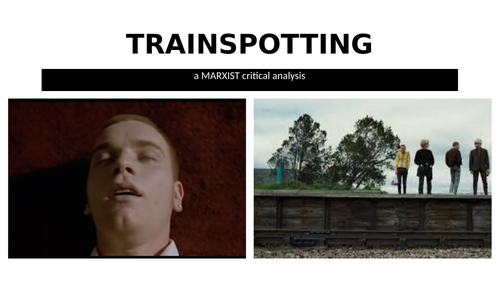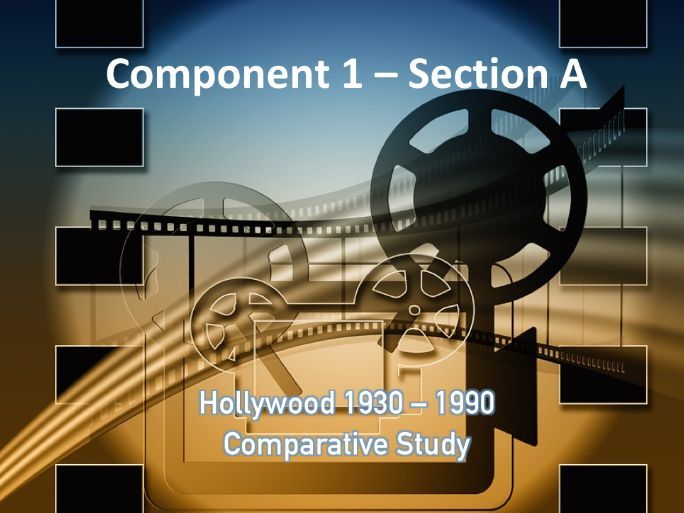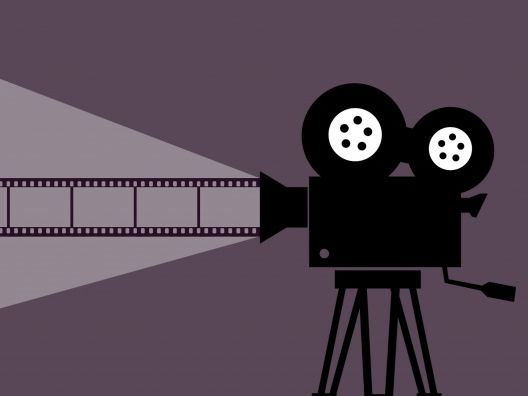63Uploads
16k+Views
2k+Downloads
All resources

MUSTANG (Erguven, 2015) A Level Film Studies Revision PowerPoint
This 69 slide full-colour interactive PowerPoint Presentation covers very targeted learing objectives for the EDUQAS A Level Film Studies Specification on Global CInema. Objectives include: Core Study Areas (Mise-en-scene, Social and Political Contexts, Reception, Exam Questions and Mark Schemes, and Production notes.
This resource will be used in a two-hour lesson and promotes discussion of key symbols and themes, as well as allowing for close analysis of mise-en-scene.

Trainspotting - Ideologies
For the** EDUQAS Film Studies A Level** Component 1C. British Films, this resource provides a great exam revision preparation lesson. This is a 24 slide PowerPoint including interactive activities that allow students to reflect on ideological meanings and to share their ideas.
The resource is focused on the EDUQAS A Level examination, and includes past questions to guide pupils in how to craft good answers targeted on ideological analysis. Includes key prompts and talking points for ideology and a sample binary analysis.

EDUQAS A-Level Film Studies - introduction to SPECTATORSHIP Issues
This resource closely follows the EDUQAS A-Level specification and the Lisa Wardle textbook to offer teachers a comprehensive introduction to the main issues around spectatorship. This is especially useful in teaching Component 1, Section B, American Film Since 2005.
Topics covered include active versus passive spectatorship, viewer positioning, analysis of how film form and narrative shape spectator response, viewing contexts, demographic factors, intertextuality, preferred, negotiated and oppositional readings ( Stuart Hallâs theory) with a few case study application suggestions (CAROL, Haynes, 2015).
The resource includes interactive exercises and is presented with nice visuals and text/picture animations.
Approx length of time - 1 entire lesson (1 hour).
Number of slides: 38.
Sale

A Marxist Analysis of TRAINSPOTTING
This 35-slide PowerPoint Presentation can be used for the âideologiesâ study of Trainspotting for the Eduqas A Level Film Studies Component 1C. (British Films).
It provides a full interactive 2 hour lesson plan with focus on exams. Marxist ideology is introduced gently with a few key concepts including: class struggle, alienation, exploitation, consumerism, commodity fetishisaton and false consciousness.
Marxist concepts are applied to particular aspects of the filmâs mise-en-scene and to particular sequences. Issues are explored through discussion with lots of question prompts to allow discussion and debate.
Sale

Moonlight - A Level Film Studies EXAM FOCUS
This 25 slide full colour PowerPoint Presentation provides helpful exam preparation for ideology and spectatorship (Eduqas Film Studies Component 1B.). The resource is closely focused on what examiners will expect, and offers talking points, discussion questions, and commentary on core study areas and representation.
Sale

Captain Fantastic: Ideology & Spectatorship
This is a 27 slide interactive PowerPoint to prepare pupils for the Eduqas A Level Film Studies, Component 1B. exam.
Ideology and Spectatorship are explored and applied to the film Captain Fantastic (Ross, 2016) with lots of questions for pupils to ponder and discuss throughout.
Helpful âtalking pointsâ about how to interpret the ideological positioning of the Cash family.
Theory: Laura Mulveyâs âmale gazeâ is touched on as is Stuart Hallâs reception theory. The presentation is designed to provide two-hour lesson plan.

Identity in Trainspotting
This is a 50 slide full colour PowerPoint Presentation on national identity versus British identity (as well as multicultural, globalized Britain) in the 1996 film Trainspotting (Danny Boyle).
This is very useful for** EDUQAS A Level Film Studies** because of the focus on representations in the film, including how particular aspects of **mise-en-scene **link to identity, narrative themes and character.
This presentation can be used to study the filmâs binary oppositions and how Scotland and London come to represent different outlooks, rather than just different geographical locations.

British Film Since 1995 (Eduqas A Level Film Studies Revision)
This 30 full colour , interactive PowerPoint Presentation is the ideal revision tool to prepare students for the A-Level Film Studies exam paper (Component 1C.).
THe two films refrenced are Trarispotting (Boyle, 1996) and Fish Tank (Arnold, 2009).
The resource closely follows the Eduqas Examination Boardâs advice and guidance on how to approach ideologies. There are example questions from past papers, discussion prompts and class exercises as well as an essay structure scaffold.
This could be used on conjunction with the two films to teach ideologies and narrative, and provides example binary analyses - a tool for ideological analysis that is transferable to any narrative.
Sale

EDUQAS Film Studies A-Level , Hollywood 1930 â 1990 Comparative Study (REVISION)
This 14 slide, fully-animated presentation involves key revision in preparation for Component 1, Section A: Hollywood 1930 â 1990 Comparative Study. Focus is on the auteur debate and industrial contexts, with other factors such as gender representation and genre also considered. The presentation involves interactive exercises and should fill one lesson.

Director Andrea Arnold - Her Auteur Signature
Studying FISH TANK (UK, 2009) for the Film or Media A-Level?
Or perhaps you are just looking for a film with empowered female leads?
Maybe you want to think about the concept of an âauteurâ director?
This resource also gives some tips for studying ideology in films.
Suited to 14+ age groups, this resource can be used for the EDUQAS Film Studies A-Level or AS Level, or just as an introduction to the concept of âAuteurâ directors or ideology.

Analysing Class representations in TRAINSPOTTING and FISH TANK (Arnold, 2009)
For **FILM STUDIES A-LEVEL **
This class exercise allows students to consider class representations in the 2009 UK independent film Fish Tank.
It will prompt discussion and allow students to think about how a variety of characters are represented.
The objective is for students to fill in their worksheets independently or in pairs, and then for each individual or pair to feedback to the whole group. In this way, a wide range of answers and insights can be explored.
The exercise could fill nearly an entire 1 hour lesson, depending upon the group size.

Sisters in Law (Documentary) Close Study
This 37 full colour slide presentation provides an overview of the issues and filmmaking practices deployed in the production of Sisters in Law, a documentary by British filmmaker Kim Longinotto and Cameroonian filmmaker Florence Ayisi. The lesson revolves around the cinema verite practices used, transnational feminism, âpost-feminismâ and its clichĂ©s, issues of representation, and the struggle for womenâs rights within societies that are culturally mixed and traditionally patriarchal. Although these are complex issues, the resource is aimed at an A-Level (Year 12 / 13) learner, following the EDUQAS Film Studies Curriculum.
For this reason, there is focus on the filmmaking practices used as well as the human rights issues within the documentary. The presentation ends with an exam question from the Eduqas A Level Film Studies Specification, so that film studies students can apply the learning from the presentation. However, this resource could also form an interesting resource for social studies, media studies or African cultural studies. The human rights issues make this a widely applicable resource that could be useful across a variety of subjects. The content should fill a two-hour lesson and provides ample scope for class discussions and (for A-Level FIlm Students) exam practice.

Scottish Identity in TRAINSPOTTING
This study of the 1996 film TRAINSPOTTING by Danny Boyle explores how Scottish identity and culture are represented in the film.
This is a 46 Slide PowerPoint Presentation and it comprises sufficient material for a comprehensive lesson plan. This is useful for media studies, film studies and cultural studies. The resource explores how stereotypes, identity and representations are constructed in a media text.

CAROL (2015, Todd Haynes) A Level Film Studies Resource
This is a 63 slide full-colour interactive PowerPoint Presentation.
It provides a two hour lesson plan covering the production context, social & political contexts, reception,** spectatorship ** (including past exam questions, Hallâs reception theory and how to apply it to CAROL, viewer positioning, binaries in the narrative, and symbolism in the mise-en-scene.
This is useful to EDUQAS A Level Film Studies Tutors but also to MEDIA studies teachers.
***Also useful for LGBTQ+ History Month **

Religious Versus Secular Laws
This 38 full color **interactive **slide presentation can be used to teach many concepts pertaining to religion and society. It explains the relationship between modern states (primarily the United States and Great Britain) and religions (with focus on Christianity & Islam). Concepts such as secularism, liberalism, theocracy and apostasy are included. Religious teachings are used and analysed, so that students are taught to demonstrate knowledge of **religious approaches to law **as well as applications and analysis. Exam practice questions are provided as well as guidance on how to answer them.
This is also useful for citizenship and cultural studies courses.

'Captain Fantastic' Scene Analysis
For Eduqas A Level Film Studies, this 43-slide full colour interactive presentation prepares students to analyse how cinematography and mise-en-scene are used to convey key narrative meanings. Students are encouraged to question, discuss and share their own thoughts and there is a strong emphasis on uses of cinematic terminology as well as analysis and exam preparation (with a practice exam question).

Covid 19, Change and Technology: THE MACHINE STOPS
E.M. Forsterâs 1909 short story about a future dystopia provides an excellent stiumlus to explore many issues that impact young peoplesâ lives in 2021.
THE MACHINE STOPS (1909) paints a picture that allows us to reflect on a multitude of topical questions:
how far has technology helped us to advance, individually and socially?
how does technology impact our relationships to our bodies and senses?
how does technology affect our relationship with the natural world?
how do metaphor, irony and allegory work to convey social messages?
how does technology impact our ability to gain knowledge of what is true and to separate fact from fiction?
Forsterâs prophetic short story was extremely prescient in its vision of a future society in which people would be confined indoors, socially distanced and isolated even from their closest kin, and in which all connection to people and the world is mediated through a âmachineâ. What happens when Kuno decides he wants to escape the machine and to live by his own wits?

Spectatorship Test
This 10 question test is a great accompaniment to the Specatatorship PowerPoint Presentation Resource for teaching the EDUQAS A-Level Film Studies Component 1, Section B. Contemporary American Film.
Topics covered include: hypodermic needle theory, active versus passive spectatorship, archetypes, intertextuality, viewing contexts, polysemy and oppositional readings of films.
The test is best used for Year 12 or Year 13 film studies but can also be helpful for Media Studies teachers vis-a-vis spectaorship and ideology.

Post-Screening Discussion Questions - Film Studies - Raise the Red Lantern (1991)
**Raise the Red Lantern **(Dir. Zhang Yimou, 1991, China) is an excellent example of a film that deconstructs how
patriarchal power works and in this sense it is a film that is empowering for women, despite being a narrative *about *
disempowered women.
The film has also been discussed as a metaphor for Chinese state power and therefore also functions a a subversive political commentary.
With beautiful cinematography and composition throughout, this film is also a study in cinematic perfection, with mise-en-scene used to great symbolic effect. The film could be studied just as an excellent example of mise-en-scene.

Do Documentaries Tell Stories? - starter exercise
This is a quick starter worksheet to get students to begin a discussion on the similarities and differences between documentaries and narrative (fiction) films. They may be surprised how many conventions and techniques overlap. This can help to stimulate discussion of what makes a film a documentary, since documentaries can be harder to distinguish from narrative films than one might think.




















